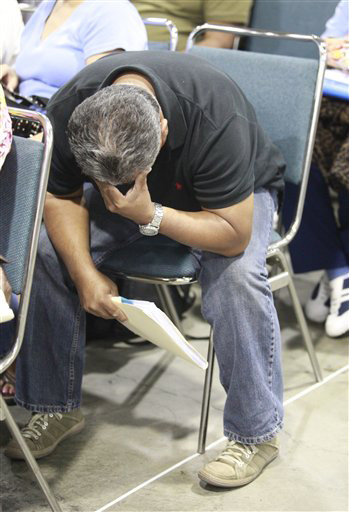
(Nicolas Miranda, 52, who just lost his job, awaits for a loan modification for his Burbank, Calif. home, among thousands of people wait in line at the Los Angeles Convention Center on Thursday, Sept. 30, 2010. A nonprofit group called the Neighborhood Assistance Corporation of America offered the chance to restructure their home loans at lower rates. (AP Photo/Damian Dovarganes)
Now that Bank of America has frozen foreclosure proceedings in all 50 states, the pressure is on other banks to put a halt to foreclosures until someone figures out what’s going on. Bank of America’s action follows weeks of allegations that records were mishandled in the foreclosure process, leading to suspicions that mortgage lenders have been evicting homeowners that shouldn’t have been evicted.
The bank’s decision confirms what many homeowners could’ve told them months ago: They’re not really sure what they’re doing.
Vicki Hugen of Eden Prairie is one of those caught in the mortgage vortex. From the story she tells, it’s not unreasonable to wonder whether some of the people evicted also gave up fighting out of sheer exhaustion from trying to get someone to listen.
Hugen and her husband separated in 2008, and he stopped paying a share of the $3,200-a-month mortgage when he lost his job in January 2009.
Hugen tried to get into Wells Fargo’s loan modification program, called the Home Affordable Modification Plan.
“I went around and around with Wells Fargo in 2009 and finally I made a last-ditch effort and said ‘is the reason I don’t qualify that I haven’t missed a payment yet?” she told me this afternoon. She said she was put on hold before a bank officer said “yes.”
Late last year, she says, her soon-to-be ex-husband offered to give her his share of the house in exchange for not paying alimony. She didn’t know whether to accept the deal because she didn’t know whether she’d be responsible for $3,200 a month or a lower payment on a modified mortgage. Her bank refused to consider her for loan modification until she got a final divorce decree. She couldn’t get a final divorce decree until she made a decision on whether to accept the house from her ex-husband, and she couldn’t accept the house from her ex-husband until the bank modified her mortgage.
Shortly thereafter — almost a year ago — she was told the bank would modify her mortgage — a 10-year, adjustable rate mortgage– and she’d have to pay about $2,064 a month. But before the modification would be permanent, she’d have to pay the $2,064 a month for three months to prove that she could. In the meantime, the remaining amount would be considered unpaid.
But three months became four, then five, then six or more and still the bank did not finalize her mortgage’s modification. The past-due amount, which would have been erased once the loan modification became final, added up.
“Every time I called they kept telling me it should only be another few weeks,” she said. She made 50 phone calls from December 2009 to August 2010 asking the same question. She was also $13,000 in arrears.
At the end of July, she started getting foreclosure notices. She also was told she was no longer in the Home Affordable program at the direction of the “investor” in the mortgage, according to the bank. The “investor,” it turned out, is Bank of America.
She filed a complaint with the bank and began working with another department at Wells Fargo, which told her to ignore the foreclosure letters. Two or three weeks ago, she says, the bank called with good news. “I got all excited” she said, and then she found out that with the principal and interest in a reworked mortgage, her payment would be $120 a month less than the original payment – $1,100 more than the amount she’d been paying.
She’s now filed a complaint with Attorney General Lori Swanson’s office, which is attempting to mediate the dispute. She says her bank is no longer returning her phone calls, and she doesn’t know what effect — if any — today’s announcement by Bank of America will have on her situation.
